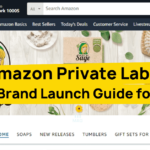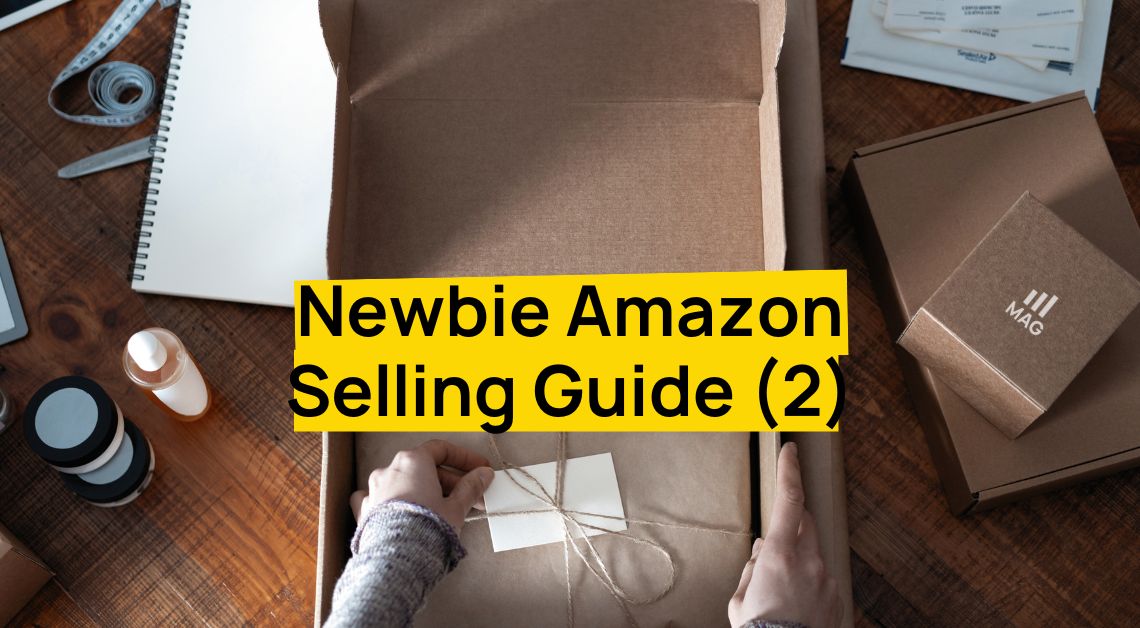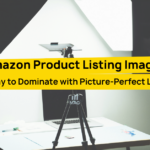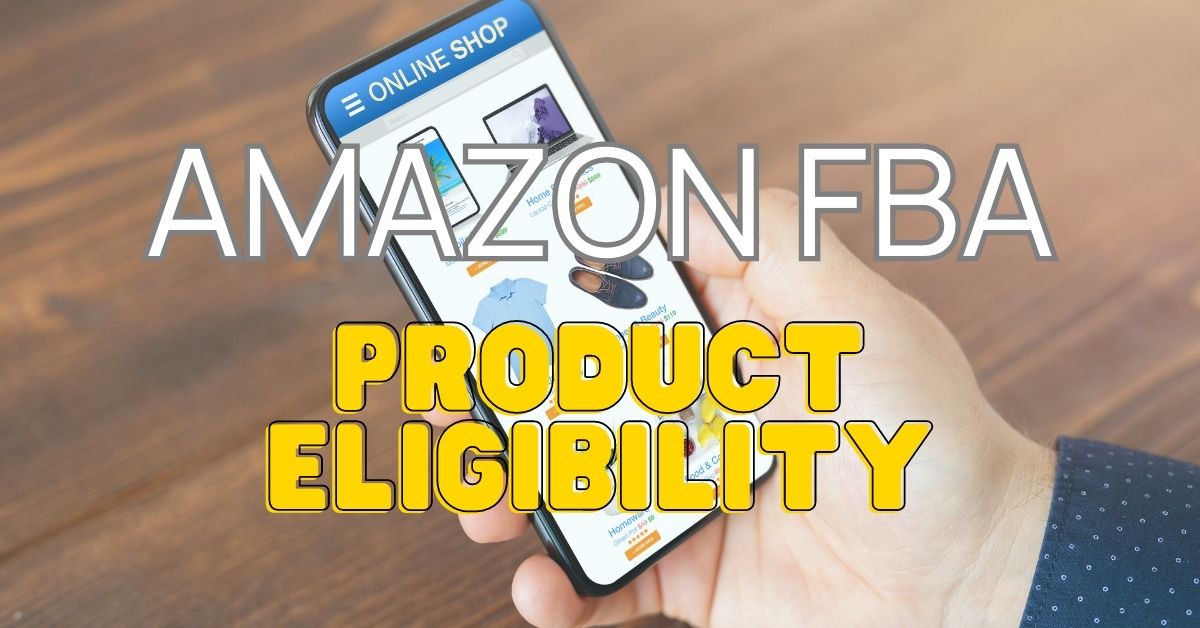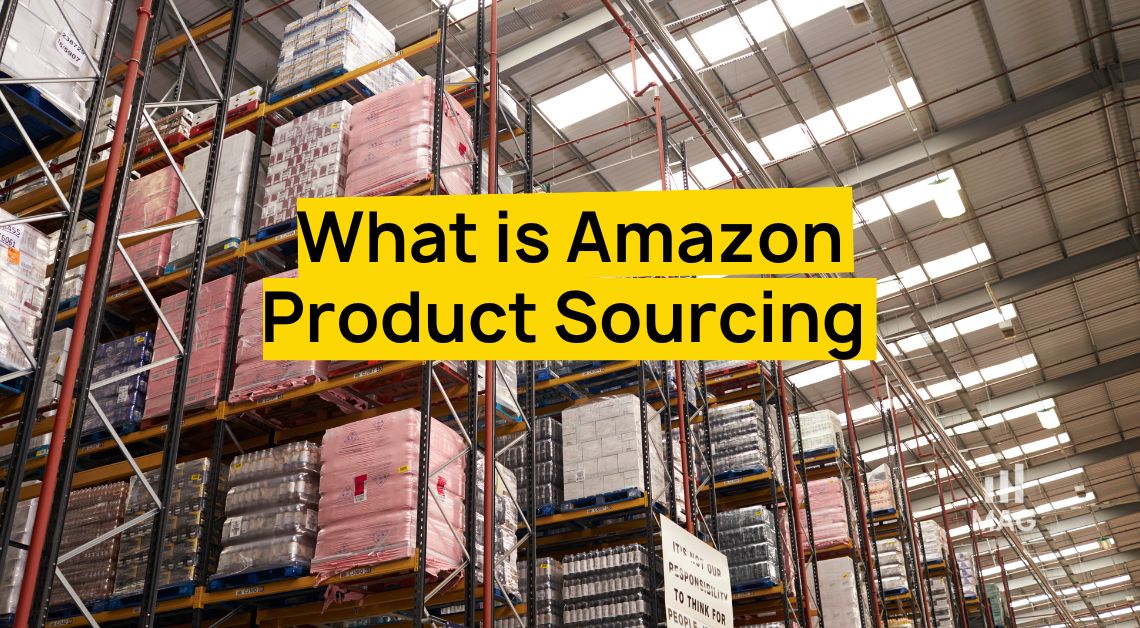Thinking of ways to be the best in the Amazon marketplace? An Amazon wholesale business could be your perfect launching point!
Experimenting with various business models on Amazon can feel overwhelming. However, one established approach stands out for aspiring sellers: wholesale.
Before you yawn and think, “Been there, done that”, hear me out. Wholesale in 2024 packs a serious punch, especially compared to other options like retail arbitrage or private label.
Why? Let’s break it down.
What is an Amazon Wholesale Business?
Implementing the wholesale business model is a great way to get started if you want to sell on Amazon.
Here’s the basic idea:
You’ll team up with approved suppliers who sell products in bulk at a discount. These products can be anything people love to buy online, like electronics, toys, or kitchenware.
You’ll then sell these discounted items on Amazon, hopefully making a good profit.
It’s kind of like buying things in bulk at a store and then reselling them for more, but all online through Amazon.
Compared to other ways to sell on Amazon, wholesale offers some cool benefits. We’ll explore those next to see if the wholesale business model is the perfect launchpad for your online selling adventure!
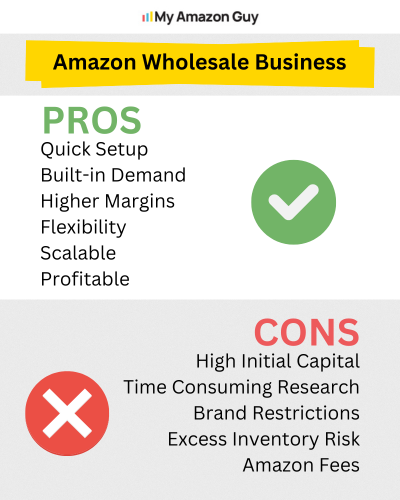
Benefits of Selling Wholesale on Amazon in 2024
Now that you know the basics of the Amazon wholesale business, let’s talk about why it’s such a great option in 2024. Here are some of the biggest perks:
- Less Money Upfront: Unlike starting your own brand where you design and make your own products (which can be expensive!), wholesale lets you sell popular items without a big investment.
- Trusted Brands = Easier Sales: People already know and love these brands, so you don’t have to convince them to try something new. This can mean more sales for you!
- Potentially Bigger Profits: Since you buy products in bulk at a discount, you can sell them for a bit more on Amazon and still make a good profit.
Basically, wholesale lets you skip some of the hard parts of starting an online business and jump right into selling stuff people already want to buy. Plus, there’s the chance to make some serious cash.
Wholesale vs. Other Ways to Sell on Amazon
Wholesale sounds pretty cool, but what about those other ways to sell on Amazon you might have heard about? Let’s see how wholesale stacks up against them:
Retail Arbitrage
Retail arbitrage is like finding good deals on single items at stores and then reselling them for more online. It can be a good way to start, but it takes a lot of time hunting for deals and you might not always find what you’re looking for.
Private Label
This is where you create your own brand and sell your own unique products. It’s awesome to have your own brand, but it takes a lot of work to design, manufacture, and market your own stuff.
Plus, it can be expensive to get started.
So, which path leads to the most gold? It depends on your goals.
Retail arbitrage is great for starting with little cash. But this approach consumes a ton of time since you are hunting for deals and competition is fierce.
A private label is the best if you want to build your own brand. However, this requires a big investment and it’s a lot of work upfront.
On the other hand, wholesale saves time finding deals, leverages established brands for easier sales, and offers more flexibility with profit margins.
Therefore, if you want to skip endless deal-hunting, sell popular brands people already trust, and have more wiggle room for pricing and profit, going wholesale is the choice for you.
How to Start Your Amazon Wholesale Business: Complete Guide
Knowing the benefits of an Amazon wholesale business, you might be tempted to create one now. But how?
Don’t worry, our Amazon agency has prepared a step-by-step guide to help you out!
While there isn’t a separate “wholesale seller account” on Amazon, there are specific steps to take to become a qualified seller and source products through wholesale channels.
Here are the steps:
1. Sign Up for a Seller Account
Head over to Amazon and create a professional selling account. There are associated fees, so make sure you understand the cost structure before proceeding.
Still not confident to create an Amazon seller account by yourself? Read: How to Open Amazon Seller Central Account and Start Selling on Amazon
2. Verify Your Business Information
Amazon requires verification of your business identity and tax information. This might involve providing your Employer Identification Number (EIN) or Social Security Number (SSN) depending on your business structure.
3. Research and Choose a Product Niche
Don’t jump in blindly! Use product research tools and competitor analysis to identify profitable wholesale opportunities.
To get more information on how to use research tools, check my video on how to do competitor research using Helium 10.
And remember these factors: competition, seasonality, and profit margins.
4. Find Reputable Wholesale Suppliers
Explore online directories, attend trade shows, or contact brands directly to find authorized wholesale distributors. Look for suppliers with competitive pricing, a good reputation, and minimum order quantities (MOQs) that fit your budget.
5. Negotiate Your Wholesale Agreement
Don’t be afraid to negotiate for better pricing and terms with your chosen suppliers. Highlight the value you bring as a seller on the Amazon platform.
6. Become a Pro Seller (Optional)
While not mandatory, consider enrolling in educational resources or exploring courses like our Amazon agency’s MAG School. This can equip you with valuable knowledge to succeed in the competitive world of Amazon.
By following these steps and securing a reliable wholesale supplier, you’ll be well on your way to launching your Amazon wholesale business.
Understanding Amazon Seller Accounts and Requirements
Before diving into the world of wholesale suppliers, it’s important to understand the two main Amazon seller account types: Individual and Professional. Each has its own fees and functionalities.
Individual Seller Account
This type of seller account is perfect for casual sellers with a limited number of products. So, if you only have less than 40 products per month, this is perfect for you.
For this type of seller account, you need to pay a per-item fee for each product you sell ($0.99 per item sold).
The Individual seller account has limited selling tools and data access compared to the Professional one.
Professional Seller Account
If you are a serious Amazon wholesale seller with a larger product volume (40+ items per month) or if you’re looking for advanced features, this is the recommended option for you.
You will need to pay a monthly subscription fee of $39.99 regardless of the number of items sold.
The fee might be worth it for some since a Professional seller account has access to advanced selling tools, detailed sales reports, and the ability to run promotions.
Requirements to Start Selling Wholesale Products
There are no additional requirements specifically for selling wholesale products on Amazon. However, as a wholesale seller, you’ll likely need to handle higher inventory levels compared to individual sellers.
This is where the Professional plan’s advanced inventory management tools become valuable, helping you effectively track and manage your stock.
Additional Considerations:
- Business Registration: Depending on your location and how you structure your business, you might need to register it officially.
- Tax Information: Amazon will require your tax information for tax purposes.
Finding the Right Wholesale Products to Sell
You’ve got your Amazon business account set up, and you’re ready to find awesome suppliers to partner with. Now comes the exciting part: finding the perfect products to sell!
But hold on – we’re not looking for old and dated products. We want hot items with high demand and low competition, the kind that can turn into a goldmine on Amazon.
Let’s find out how you can find profitable products:
Use Product Research Tools
Product research tools act as your data-driven assistants. Popular options include Jungle Scout and SmartScout.
These tools provide valuable information like estimated sales, profit margins, and competitor analysis. By using these, you can find products with high sales volume (good demand) and low competition (easier to stand out).
Analyze Amazon Trends
Amazon itself offers valuable insights to help you out. Check out Amazon Seller Central and explore features like “Product Opportunity Explorer” and “Brand Analysis” (available for Brand Registered sellers).
These features reveal the trending products and popular searches on Amazon. So, you can discover items that are experiencing a surge in popularity and high sales.
What’s more, you can check what people are actively searching for on Amazon – sparking product ideas.
Consider Seasonality
Timing is everything!
Selling winter sports equipment in the summer might not be the best strategy. Here’s how seasonality can be your advantage:
- Think Holidays
Specific products see a surge in popularity around holidays. Stock up on Halloween costumes or Christmas decorations well in advance. - Back-to-School Rush
School supplies and backpacks experience a demand spike before the fall semester. Plan your inventory to meet this seasonal demand. - Unexpected Trends
Stay updated on current events and pop culture. A new fitness craze might create demand for specific workout gear. Be quick to identify these trends and adjust your inventory accordingly.
Think Beyond the Tools
Don’t rely solely on tools. Use your creativity and consider products that solve problems, cater to a niche, or offer unique features.
Finding the perfect wholesale product requires some effort. But by combining research tools, analyzing trends, and considering seasonality, you can uncover Amazon products that will sell well.
To get a better idea on how to find the correct products to sell, click on this product sourcing guide.
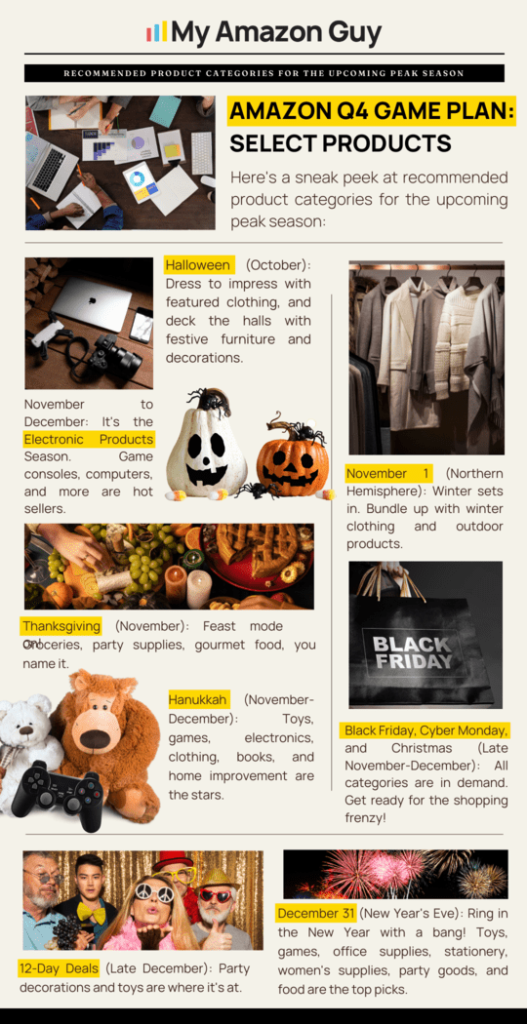
Sourcing Reliable Wholesale Suppliers
Finding the right wholesale suppliers is like assembling your dream team – they’re essential for the success of your Amazon business.
Where to find trustworthy partners:
- Online Directories: Explore platforms like ShipStation to find suppliers by category and location. Read reviews before committing!
- Trade Shows: Network with suppliers face-to-face, see products firsthand, and discover trends.
- Manufacturer Websites: Look for authorized distributors listed on brand websites.
- Cold Outreach: Contact brands directly and express your interest in becoming a reseller.
Negotiating Wholesale Deals with Suppliers
Found fantastic suppliers? Now let’s get the best deals!
Below are tips on how to negotiate like a pro:
- Do Your Research
Research average wholesale prices for your products. This is your ammo! Industry websites and online tools can help. - Highlight Your Value
Tell suppliers why you’re a great partner. Explain your business goals and how you can sell a lot on Amazon. This sweetens the deal for them. - Start with Purchase Price
Negotiate the price per unit first. Be clear on what you want, but be willing to meet them halfway. - Minimum Order Quantities (MOQ)
This is the minimum number of items you have to buy at once. If it’s high, try to negotiate it down, especially when starting out.
Show them your sales projections to convince them you’ll grow. - Payment Terms
Negotiate when you pay. Popular options include paying upfront, paying part upfront and the rest later, or net terms (paying after a certain time). Choose what works best for your cash flow.
Remember: Be polite and professional throughout. Building a good relationship with your supplier is key.
Negotiation is a conversation, not a fight! Find solutions that benefit both of you.
By following these tips, you can land those wholesale deals.
Creating Optimized Product Listings for Wholesale Products
Your product listing is your storefront on Amazon – it’s what convinces customers to click “buy”! Here’s how to create listings that turn heads and boost sales for your wholesale products:
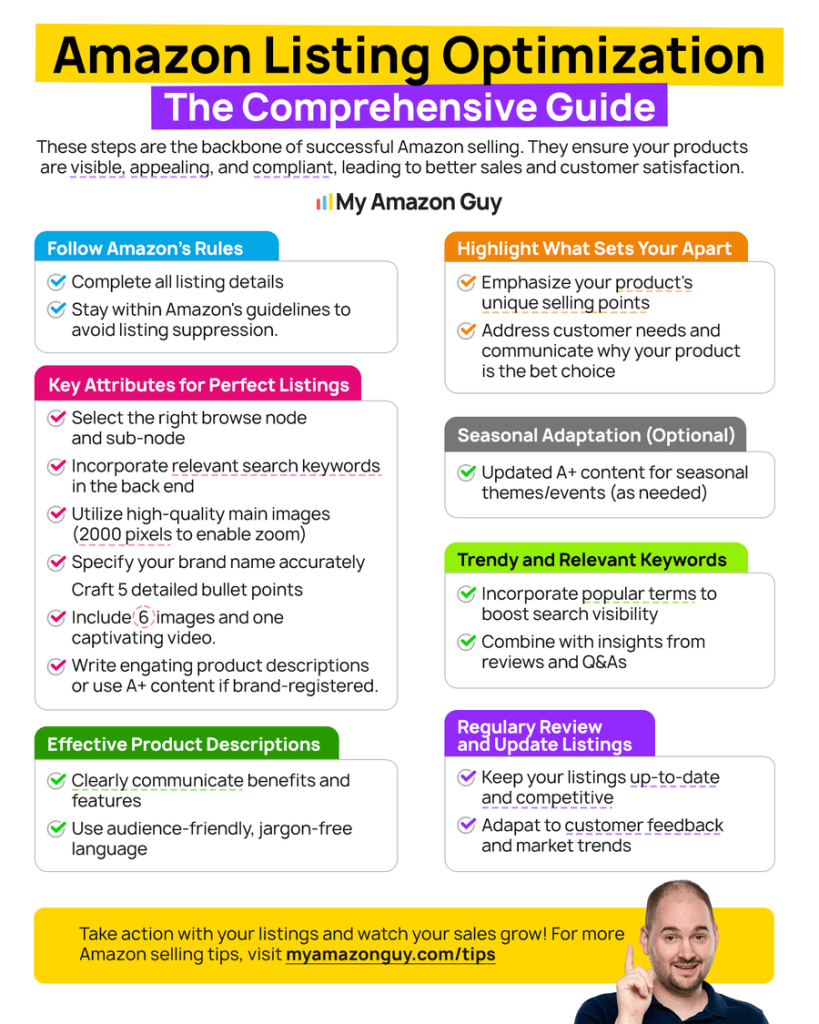
Tip: Encourage satisfied customers to leave positive reviews. Reviews build trust and social proof, influencing other buyers.
- Stellar Images:
Use high-quality, well-lit photos that showcase your product from all angles. Include close-up shots to highlight details and features.
- Keyword Magic:
Research relevant keywords that people might search for when looking for your product. Include these keywords throughout your listing title, description, and bullet points, but avoid keyword stuffing (using them unnaturally).
- Descriptive Details:
Clearly explain what the product is, its features and benefits, and how it solves customer problems. Use bullet points to make your description easy to read and scannable.
- Be Honest and Accurate:
Ensure your descriptions and specifications are accurate and avoid misleading information. This helps customers make informed decisions and reduces returns.
- Follow Amazon’s Guidelines:
Amazon has specific guidelines for product listings. Make sure your listings comply with these guidelines to avoid potential issues. You can find these guidelines on Amazon Seller Central.
Marketing and Promotions for Your Wholesale Products
Listing your products on Amazon is a great start, but to truly stand out, you need a marketing strategy for customers to purchase products.
Let’s discuss how you can create a buzz around your wholesale business on Amazon:
- Social Media Savvy:
Social media platforms like Facebook, Instagram, and TikTok are powerful tools to connect with potential customers. Create engaging content showcasing your products in action, highlight their benefits, and run targeted ads to reach your ideal audience.
- Influencer Power:
Partnering with social media influencers who resonate with your target audience can be a game-changer. Influencers can promote your products to their followers, generating interest and trust in your brand.
- Amazon PPC Ads:
Amazon Pay-Per-Click (PPC) advertising allows you to display targeted ads for your products on Amazon search results pages. This is a great way to increase product visibility and reach potential customers actively searching for similar items.Want to know how Amazon PPC can help your wholesale business? Check this Amazon PPC guide.
- Bundle Deals and Promotions:
Offer bundle deals or discounts to incentivize purchases. Consider creating product bundles that combine complementary items or offering limited-time promotions to attract new customers.
- Customer Reviews are King:
Encourage satisfied customers to leave positive reviews on your product listings. Positive reviews build trust and social proof, influencing other buyers to choose your products.
Ready, Set, Sell!
The Amazon marketplace awaits! With a strategic approach, the right tools, and the knowledge you’ve gained from this guide, you can navigate the wholesale world and establish a thriving business on Amazon.
Remember, success comes from taking action. So, put what you’ve learned into practice, embrace the journey, and be prepared to witness your Amazon wholesale business blossom.
Do you want to start an Amazon wholesale business? Our Amazon agency can help you out! Contact us today for a consultation to get your business started.


